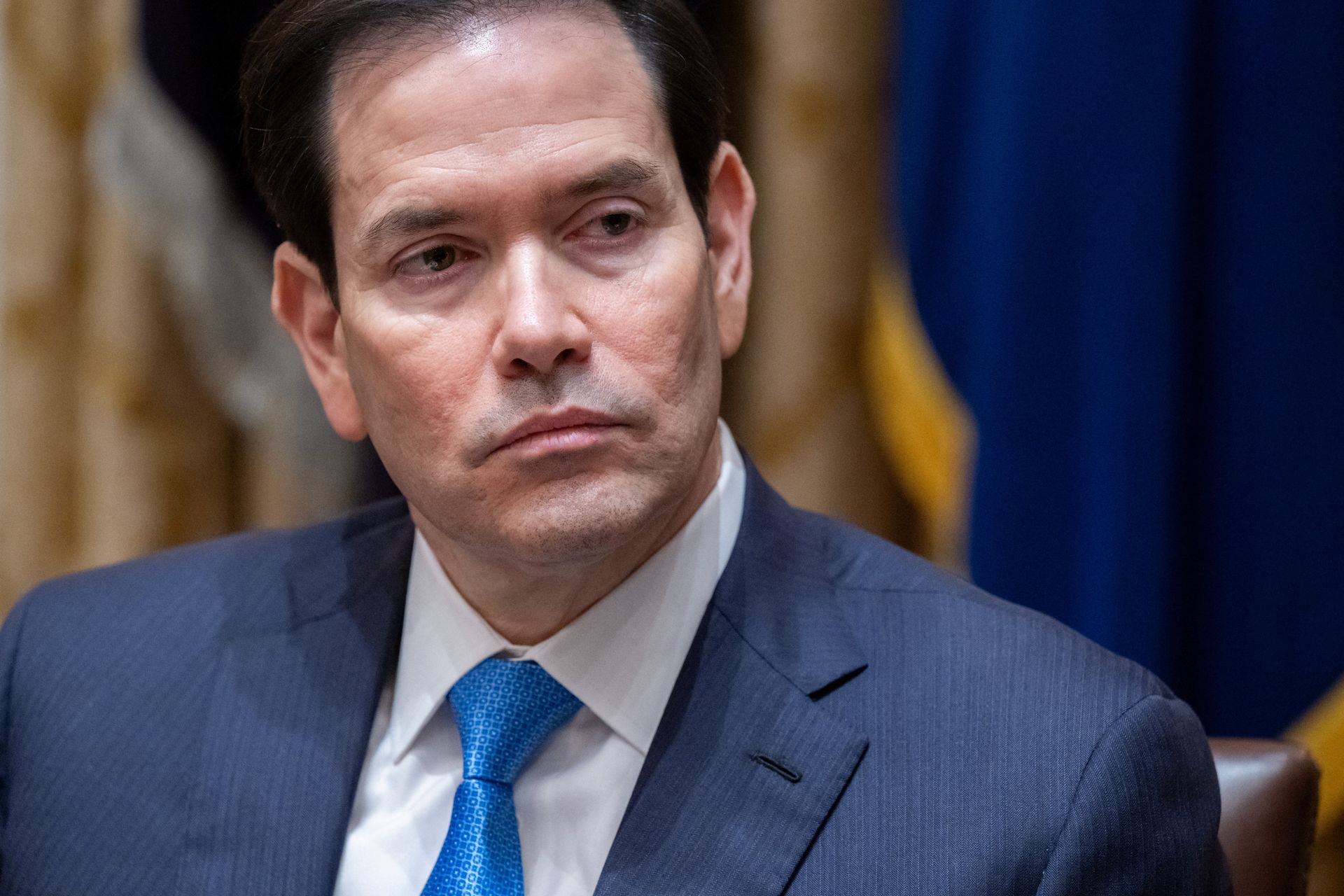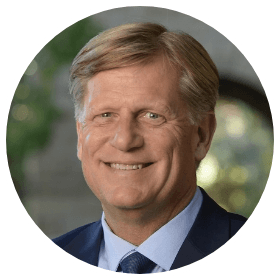Putin’s plan for Ukrainian surrender does not serve American national interests

U.S. President Donald Trump (R) reaches out to shake hands with Russian President Vladimir Putin as they pose on a podium on the tarmac after arrival at Joint Base Elmendorf-Richardson in Anchorage, Alaska, on Aug. 15, 2025. (Andrew Caballero/AFP via Getty Images)

Michael McFaul
Ukrainians and their democratically elected leaders will have to assess how to deal with Putin’s latest 28-point proposal for Ukrainian surrender — sometimes referred to as “Trump’s peace plan.”
It’s tricky because rejecting the plan entirely risks alienating President Donald Trump and his senior advisors. But as an American, my reaction is unequivocal.
This Putin plan does not serve American national interests. The sooner Trump and his team amend it or abandon it, the better it will be for U.S. security and prosperity. First, as excellent reporting has now uncovered, President Trump and Secretary of State Marco Rubio did not draft this plan after consulting with Ukrainian and Russian leaders as would typically happen in a competent mediation effort.
Instead, reporting suggests that the head of Russia’s government investment fund, Kirill Dmitriev, drafted this latest proposal in close cooperation with Trump’s special envoy for the Middle East, Steve Witkoff.
Dmitriev then reportedly leaked the plan to the American press to tie Trump’s hands. (If Trump’s administration had any spine at all in dealing with the Kremlin, Washington should insist that Dmitriev’s decision to jam Trump and his team disqualifies him from participating in any future negotiations.)
Rubio initially distanced himself from the plan, suggesting to senators that he had nothing to do with writing it.
But then, presumably after a call from Trump or Witkoff, Rubio walked back that disclaimer.
This process underscored dysfunction in the foreign policymaking process within the Trump administration — not a great look for American power and prestige in the world.
Second, the plan reiterates all of Putin’s longstanding demands for Ukraine’s surrender.
Endorsing this plan embarrassingly underscores that all of Trump’s courtship of Putin, punctuated by rolling out the red carpet for the Russian imperialist dictator in Alaska in August, has yielded not a single substantive concession from Russia.
The 28-point plan just repackaged Putin’s maximalist demands from years ago.
That reveals American weakness.
This inability to persuade Putin to change any of his demands reaffirms a dangerous pattern in Trump’s foreign policy, also on display at the recent Trump-Xi summit in South Korea — Trump coerces weak democracies but acquiesces to powerful autocracies. Such a pattern does not advance U.S. interests effectively.
Third, the Putin plan for Ukraine’s surrender radically undermines Ukrainian sovereignty.
Most outrageously, the new Russian plan calls on Ukraine yet again to abandon territory still held by its soldiers in Donbas. Putin has been trying to seize this area of eastern Ukraine since 2014; it seems he has now given up on his soldiers for achieving the objective and is just asking Trump to hand it over to him.
Equally egregious are the provisions in the plan that limit Ukraine’s sovereignty, including caps on the size of the army and a prohibition on joining NATO.
Most arrogantly, the proposal states that Ukraine will be “eligible” to join the European Union — as if Russia had any say in this matter.
The United States needs a strong Ukraine to help contain Putin’s Russia. Many of these provisions do the exact opposite; they weaken Ukraine.
Today, even after fighting the Russian army for over three years, the Armed Forces of Ukraine remain the most effective military in Europe. NATO — of which the United States is still a member, in case some in Washington forgot — needs that army to stay strong to deter any future aggression from Russia.

After Putin’s invasion of Ukraine ends, Ukrainian soldiers and their new drones and other weapons systems invented out of necessity in the current conflict can be deployed in other NATO countries bordering Russia to enhance deterrence.
Trump apparently also decided unilaterally to speak on behalf of the other G7 countries — all of which are democratic allies of the U.S. — when agreeing in this document to invite Russia to rejoin what would become the G8.
The plan also dictates when the Ukrainian people must hold new elections, saying nothing about new, free, and fair elections in Russia.
This Russian plan rewards imperialism and acknowledges annexation. American interests are not advanced by rewarding imperial conquest.
After World War II, the U.S. led the free world in establishing norms against annexation and in favor of decolonization. That post-World War II order served American security and economic interests well, and we emerged as the world’s most powerful and prosperous country.
Returning to an anarchic world in which great powers can invade their neighbors, seize territory, and slaughter civilians will catapult us back to the interwar period in the 1930s. We know how tragically that ended.
Moreover, after Dmitriev leaked the plan to the press, the tensions with our European allies only grew. That, of course, was part of Moscow’s intention in leaking it.
Pursuing its implementation without amendment will do even further damage to our relations with our NATO allies. In this new era of great power competition with China and Russia, about which I wrote in my latest book, Autocrats vs Democrats, the United States needs allies to prevail.
Beyond Europe, the 28-point plan also damages America’s interests in Asia. Accepting the erosion of norms regarding sovereignty sends a terrible signal to Beijing that Xi Jinping and the Chinese Communist Party can also use force for territorial gain.
Such a signal could wrongly tempt Xi into trying to seize Taiwan by force, a military action that would destroy the global economy and easily drag the United States into war with the People’s Republic of China. That is not in American national interests.
Supporting this Russian proposal also aligns the United States with the autocratic, imperial aggressor in this war. That does not enhance our international reputation.
To successfully compete against China and Russia and their authoritarian allies over the next century, the United States needs to be firmly on the side of the free world.Moreover, in a pattern now consistent with other Trump-backed deals, the plan offers all sorts of ways for Americans to make money.
One bullet point even describes how “$100 billion in frozen Russian assets will be invested in US-led efforts to rebuild and invest in Ukraine,” with the critical caveat that the US “will receive 50% of the profits.”
Casting the United States as a country only interested in making money, even off of countries rebuilding after war, further undermines our reputation as a moral force in the world.
Finally, even if President Volodymyr Zelensky wanted to accept this plan, his citizens and soldiers would not.
Trump, therefore, will look like a weak and failed negotiator if he tries to force Ukraine to accept it. He will not win the Nobel Peace Prize in attempting to impose this plan on Ukraine. Neville Chamberlain never won the Nobel Peace Prize. Nor did Churchill, Roosevelt, and Stalin for their work in Yalta.
To advance American interests in Europe and the world, the only path forward is a serious amendment to this draft document that removes the most egregious violations of Ukrainian sovereignty and calls upon Putin to make concessions, too.
NATO leaders did not seek Joseph Stalin's permission when they established the alliance in 1949. And no one called Nikita Khrushchev and asked for his blessing to bring part of Germany into the alliance in 1955. Asking for Moscow’s permission now — giving Putin a veto over how Ukraine conducts its own foreign policy — harkens back to earlier centuries of spheres of influence.
We all know how poorly those eras ended.
A strong, democratic, and independent Ukraine advances American security and values both in Europe and around the world. A weak Ukraine subjugated to Russia undermines American security and values in Europe and around the world. Standing up to Putin makes the United States look strong. Appeasing Putin makes the United States look weak.
It’s just that simple.

Editor's Note: The opinions expressed in the op-ed section are those of the authors and do not purport to reflect the views of the Kyiv Independent.













